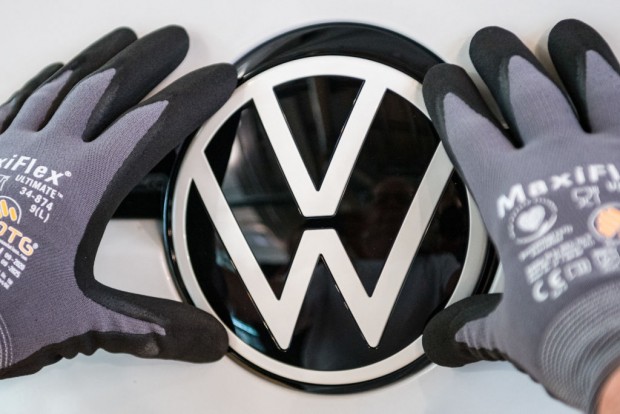A VW logo is seen at the assembly line for the Volkswagen (VW) ID 3 electric car of German carmaker Volkswagen, at the 'Glassy Manufactory' (Glaeserne Manufaktur) production site in Dresden, eastern Germany on June 8, 2021.
(Photo : JENS SCHLUETER/AFP via Getty Images)
Supply chain issues will continue to affect the global auto industry, with computer chip shortages expected to linger this year, according to major automaker Volkswagen. Murat Aksel, Volkswagen's board member and head of procurement, told German car magazine Automobilwoche in an interview that the volatile situation in the semiconductor sector will affect them at least beyond the first half of this year, and they must continue to fight for every part.
Aksel added that supply chain issues related to computer chips might slightly ease in the second half of 2022, but the increasing levels of demand and structural problems will make predictions inaccurate until next year. Aksel's comments come amid reports that Volkswagen was forced to slash its production forecasts for this year. That also happened last year when Volkswagen cut down its predictions for 2021 from 9.3 to just 9 million vehicles produced.
A spokesperson of Volkswagen's subsidiary Audi saw this particular problem back in mid-December, telling Reuters in an interview that they expect to be occupied with this crisis for months on end in the coming year, and the scarcity of semiconductors could extend for even longer.
Supply chain issues a major headache for automakers
The ongoing supply chain issues have struck the global auto industry hard, particularly during the second half of last year. According to GlobalData, only 79.9 million light vehicles were produced globally in 2021, way below the global demand of 83.9 million units.
Car production in the United Kingdom last year was at its lowest level since 1956, according to data from the Society of Motor Manufacturers and Traders (SMMT). Only 860,000 vehicles were produced in the UK last year, a massive 6.7 percent drop compared to its production numbers in 2020.
With the semiconductor crisis still affecting its car production, Volkswagen has decided to cut nearly all-night shifts at its main plant in Germany. Three assembly lines in Wolfsburg will be affected by this policy which will start in the second quarter of 2022.
Related Article: Supply Chain Woes Persist for Honda and Nissan as Automakers Cut Production for February 2022
Workers demand partial compensation after Volkswagen decision
Volkswagen's decision has drawn the ire from its labor head Daniela Cavallo, who said that a compromise on compensation needs to be found between the company and the workers. She said, "Our colleagues aren't responsible for the fact that order books are overflowing while we can't make the vehicles because of the lack of semiconductors."
Cavallo added that they would fight for partial compensation. Volkswagen made it clear that a fourth assembly line, which handles its Tiguan and its hybrid models, the Seat Tarraco and Touran, will continue to run early, late, and night shifts.
Volkswagen said that the decision to cut the night shift was made in response to repeated short-notice cancelations and the need to furlough its workers. Gunnar Kilian, Volkswagen's board member in charge of personnel, said that this step would also involve workforce cuts and the loss of hardship allowances for those working the night shift.
READ MORE ON AWN:
Ram Recalls Over 170,000 Trucks Due To Defective Wipers; Loose Wiper Arm Nuts the Main Issue
Ford to Spend Another $20 Billion for EV Program as Carmaker Plans Major Reorganization in Company
See Now: OnePlus 6: How Different Will It Be From OnePlus 5?




























